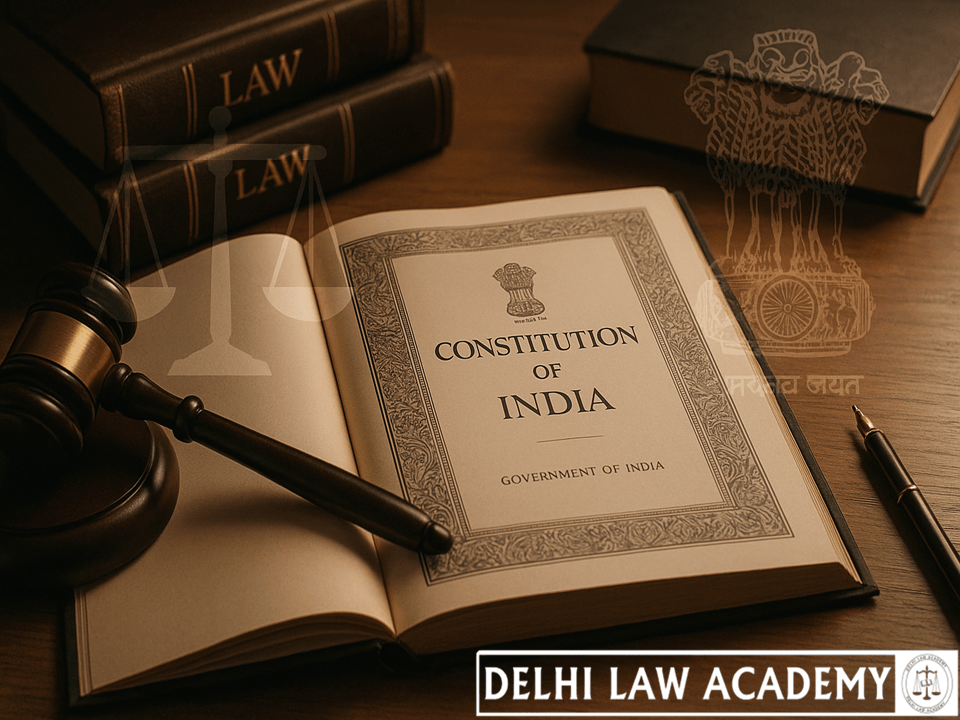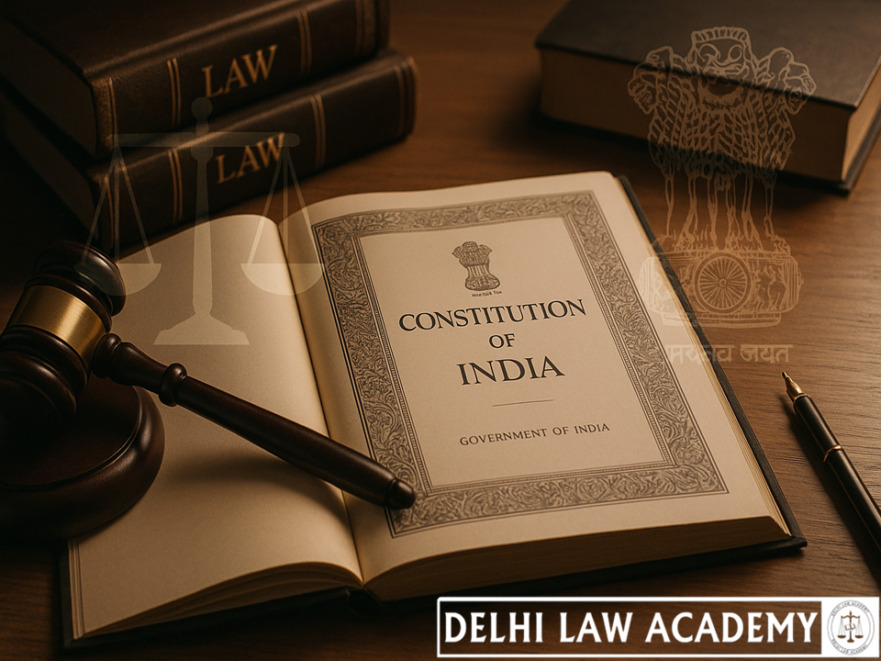
🏛️ State Legislature – Articles 168 to 181
Delhi Law Academy Jaipur | Simplified Notes for RJS, DJS & PCS(J) Aspirants
⚖️ Constitutional Provisions
Article 168 – Constitution of Legislature
- A State Legislature consists of:
- Governor
- Legislative Assembly – in all States
- Legislative Council – in Andhra Pradesh, Bihar, Maharashtra, Karnataka, Telangana, Uttar Pradesh
Article 169 – Creation/Abolition of Legislative Council
- Parliament may by law create or abolish Legislative Council for a State.
- Pre-requisite: Legislative Assembly passes resolution to that effect by a majority of not less than 2/3rd members of Assembly present and voting.
- A law creating/abolishing Legislative Council is not deemed amendment of Constitution under Article 368.
Article 170 – Composition of Legislative Assembly
- Legislative Assembly shall consist of not more than 500 and not less than 60 members chosen by direct election from territorial constituencies.
- Each State shall be divided into territorial constituencies of nearly equal population.
- Population for this purpose means 2001 census till first census after 2026.
- Readjustment after each census to be done by authority determined by Parliament.
Article 171 – Members of Legislative Council
- Number of members: Maximum 1/3rd of Legislative Assembly members, Minimum 40.
- Composition:
- 1/3rd elected by MLAs
- 1/3rd elected by members of municipalities and local authorities
- 1/12th elected by graduates of 3 years standing
- 1/12th elected by teachers of 3 years standing in secondary schools and higher
- 1/6th nominated by the Governor with special knowledge or experience in Science, Art, Literature, Social service, Cooperative movement
Article 172 – Duration of State Legislatures
- Legislative Assembly – 5 years normal tenure, can be dissolved earlier.
- During Emergency, term may be extended by Parliament by one year at a time but not beyond 6 months from end of Emergency.
- Legislative Council – Not subject to dissolution; 1/3rd members retire every 2 years.
Article 173 – Qualifications for Membership
- Should be a citizen of India.
- Should make oath before a person authorized by Election Commission.
- Minimum age: 25 years for Assembly, 30 years for Council.
- Other qualifications prescribed by Parliament by law.
Article 174 – Sessions, Prorogation and Dissolution
- Houses to be summoned by Governor; not more than 6 months between two sessions.
- Governor may prorogue Houses and dissolve Legislative Assembly.
Article 175 – Rights of Governor
- Governor has the right to address either House or joint sitting of Legislature.
- May send messages to either House relating to a pending bill or otherwise.
Article 176 – Special Address by Governor
- Governor shall address the Assembly, or both Houses assembled together, at:
- First session after each general election to Assembly
- First session of each calendar year
Article 177 – Rights of Ministers
- Every Minister has the right to speak and participate in proceedings of either House but not to vote.
- Advocate General of the State also has similar rights.
Article 178 – Officers of Legislative Assembly
- Legislative Assembly shall choose one member as Speaker and another as Deputy Speaker when offices become vacant.
Article 179 – Removal
- Speaker or Deputy Speaker can be removed by resolution of Assembly passed by majority of all members after 14 days notice.
- Speaker or Deputy Speaker vacates office if ceases to be a member of Assembly.
- On dissolution, Speaker continues until first meeting of new Assembly.
Article 180 – Vacancy
- If Speaker’s office is vacant, duties performed by Deputy Speaker.
- If both are vacant, duties performed by member appointed by Governor.
- When both are absent, duties performed by person as determined by rules or Assembly.
Article 181 – Removal Proceedings
- During removal proceedings of Speaker, he shall not preside, though present.
- Similar provision applies for Deputy Speaker.
- Speaker has right to speak and take part in proceedings but can vote only in first instance and not in case of equality of votes.
📘 For more Constitution Notes, visit
www.delhilawacademy.com
📘 Stay Ahead with Delhi Law Academy!
Get access to free monthly current affairs, read our insightful blogs,
and explore free study resources prepared by experts at DLA Jaipur. 🚀
💡 Frequently Asked Questions on State Legislature (Articles 168–181)
🏛️ What are the components of a State Legislature under Article 168?
Article 168 provides that a State Legislature consists of the Governor and one or two Houses — the Legislative Assembly in every state and, where applicable, the Legislative Council (in Andhra Pradesh, Bihar, Maharashtra, Karnataka, Telangana, and Uttar Pradesh).
🗳️ How can a Legislative Council be created or abolished under Article 169?
Under Article 169, Parliament may create or abolish a Legislative Council if the Legislative Assembly of the State passes a resolution to that effect by a majority of not less than two-thirds of members present and voting. Such a law is not treated as a constitutional amendment.
👥 What is the composition of the Legislative Assembly as per Article 170?
The Legislative Assembly shall have between 60 and 500 members, directly elected from territorial constituencies. Each State is divided into constituencies with roughly equal population, based on the 2001 census until the first census after 2026.
🎓 Who are the members of the Legislative Council as defined in Article 171?
Article 171 specifies that the Legislative Council consists of members elected by MLAs, local authorities, graduates, and teachers, along with 1/6th nominated by the Governor for their expertise in fields like science, art, literature, social service, or the cooperative movement.
📆 What is the duration of the Legislative Assembly and Council under Article 172?
The Legislative Assembly has a tenure of five years unless dissolved earlier. During an Emergency, its term can be extended by one year at a time but not beyond six months after the Emergency ends. The Legislative Council is a permanent body, with one-third of its members retiring every two years.
⚖️ What are the powers and removal process of the Speaker under Articles 178–181?
The Speaker and Deputy Speaker are chosen by the Legislative Assembly. They can be removed by a resolution passed by a majority of all Assembly members with 14 days’ notice. During removal proceedings, the Speaker cannot preside but may participate and vote only in the first instance.
Contact us
📍 Delhi Law Academy – Jaipur Branch
6C, Tower 2, Coaching Hub, Pratap Nagar, Jaipur – 302033
📞 Phone:
+91 9911916552
+91 8447285606
✉️ Email:
contactus@delhilawacademy.com

